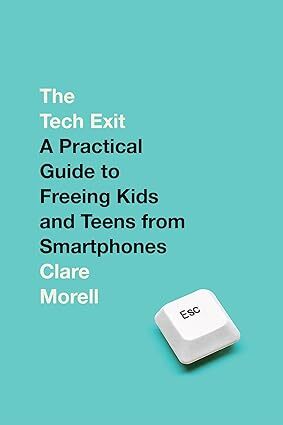Book recommendation: The Tech Exit (A Practical Guide to Freeing Kids and Teens from Smartphones)
A Note From Craig...
Last week, a group of approximately 60 people from The Bridge travelled to the Okanagan Gleaners in Oliver, BC. It is not officially a “family” trip- anyone is welcome to come. However, over the last four years, the way it has worked out is that it’s been families with school-aged children that have joined us. Shortly before this year’s trip, I had bought and read a very recently published book called “The Tech Exit: a practical guide to freeing kids and teens from smartphones”. Let me tell you about the book and then I’ll tell you about what it had to do with the Gleaners. Hopefully, by the end of this article, some of you will be convinced you need to read this book as well.
The Tech Exit is written by Clare Morell, a “fellow” at the Ethics and Public Policy Center, which is a Washington think tank significantly shaped by Christian faith. Morell herself is married to a pastor, and while Christian faith clearly influences her writing, this isn’t a “Christian book”. It’s written for anyone who is concerned by how screens seem to have taken over an entire generation and are wondering what can be done. The book especially addresses families, though schools and governments also have a role to play in undoing some of the damage done by screens.
There were a bunch of things I loved about this book. The biggest one is that Morell pulls no punches. A lot of books about usage of technology, especially in childhood and adolescence, boil down to “harm reduction”. They’ll tell you that it’s unavoidable for kids’ lives to be thoroughly intertwined with social media or video games or whatever else, and that the best you can do is set screen time limits and enact parental controls. The Tech Exit says that those strategies fall well short and that something much more drastic is necessary: a full-out avoidance of smartphones for kids and teens. This is an uncompromising, no-holds-barred book. Just to show you how bold this book is, Morell quotes a former Member of Parliament named Miriam Cates in a speech to British Parliament that (advance warning) will feel very uncomfortable to read: “Imagine if, on their daily walk to school, our children had to witness the beheading of strangers or the violent rape of women and girls. Imagine if, when hanging out in the local park, it was normal for hundreds of people to accost our child and encourage them to take their own life. Imagine if it was a daily occurrence for our children to be propositioned for sex or blackmailed into stripping for strangers. Imagine if every mistake that our child made was advertised on public billboards, so that everyone could laugh and mock until the shame made life not worth living. This is not a horror movie or some imaginary Wild West; this is the digital world that our children occupy, often for hours a day.” Morell follows that with her own application: “we don’t take our children to bars and strip clubs and blindfold them or have them wear earplugs. That would be absurd. We just don’t let them go to those places. It should be the same for the virtual world.”
The other thing I loved about this book was its very practical orientation. It’s not just a book about the theoretical dangers of the digital world, it presents deeply pragmatic solutions to this problem. I used to think that if you had already opened the door to some of this as a family, there was no going back. However, Morell provides a strategy for families to undo a screen-saturated life. A significant aspect of that is to find other families that are on the same page. Doing the Tech Exit by yourself is going to be really, really hard. But if there’s a community around you that is committed to doing it together, your kids are much more likely to buy in. Morell again: “The only successful approach to pushing screens out of childhood is to stand with others and build counter pressures through communities.”
And that leads me to what happened at the Gleaners last week. I began the week by telling everyone about the Tech Exit book. I talked about how during this week at the Gleaners, drawing on Paul’s language in Ephesians 4:22-24, we wanted to take certain things off and put certain things on. We wanted to take off our usage of screens and put on service and relationships. The parents had already been warned in advance that we’d be asking for kids not to have their devices, so I don’t think it was a shock.
I was so, so grateful for what I heard on Friday, our final day there. Every year, we end the week by going around and having everyone share how the Lord worked in their life that week, or what stood out the most. There were a few kids who said that God had showed them the goodness of a screen-free life (or something along those lines). Parents, too, commented on how great it was to see kids interacting with each other without devices. A few of the kids mentioned how they had discovered a love for fishing this past week (of all things!) and the value of doing things with others in God’s creation. We’ll see if those insights get carried out into life outside of the Gleaners!
Here’s my big point, though: we all want to see kids and teens flourishing in the Lord. I think we all know, on some level or another, that smartphones, social media, video games, and so on are not helping that vision. I would want everyone to read The Tech Exit, but especially parents. If you are a parent or a grandparent, I strongly, strongly recommend reading this book. It will be a gift to you and to the kids in your lives.
The Tech Exit is written by Clare Morell, a “fellow” at the Ethics and Public Policy Center, which is a Washington think tank significantly shaped by Christian faith. Morell herself is married to a pastor, and while Christian faith clearly influences her writing, this isn’t a “Christian book”. It’s written for anyone who is concerned by how screens seem to have taken over an entire generation and are wondering what can be done. The book especially addresses families, though schools and governments also have a role to play in undoing some of the damage done by screens.
There were a bunch of things I loved about this book. The biggest one is that Morell pulls no punches. A lot of books about usage of technology, especially in childhood and adolescence, boil down to “harm reduction”. They’ll tell you that it’s unavoidable for kids’ lives to be thoroughly intertwined with social media or video games or whatever else, and that the best you can do is set screen time limits and enact parental controls. The Tech Exit says that those strategies fall well short and that something much more drastic is necessary: a full-out avoidance of smartphones for kids and teens. This is an uncompromising, no-holds-barred book. Just to show you how bold this book is, Morell quotes a former Member of Parliament named Miriam Cates in a speech to British Parliament that (advance warning) will feel very uncomfortable to read: “Imagine if, on their daily walk to school, our children had to witness the beheading of strangers or the violent rape of women and girls. Imagine if, when hanging out in the local park, it was normal for hundreds of people to accost our child and encourage them to take their own life. Imagine if it was a daily occurrence for our children to be propositioned for sex or blackmailed into stripping for strangers. Imagine if every mistake that our child made was advertised on public billboards, so that everyone could laugh and mock until the shame made life not worth living. This is not a horror movie or some imaginary Wild West; this is the digital world that our children occupy, often for hours a day.” Morell follows that with her own application: “we don’t take our children to bars and strip clubs and blindfold them or have them wear earplugs. That would be absurd. We just don’t let them go to those places. It should be the same for the virtual world.”
The other thing I loved about this book was its very practical orientation. It’s not just a book about the theoretical dangers of the digital world, it presents deeply pragmatic solutions to this problem. I used to think that if you had already opened the door to some of this as a family, there was no going back. However, Morell provides a strategy for families to undo a screen-saturated life. A significant aspect of that is to find other families that are on the same page. Doing the Tech Exit by yourself is going to be really, really hard. But if there’s a community around you that is committed to doing it together, your kids are much more likely to buy in. Morell again: “The only successful approach to pushing screens out of childhood is to stand with others and build counter pressures through communities.”
And that leads me to what happened at the Gleaners last week. I began the week by telling everyone about the Tech Exit book. I talked about how during this week at the Gleaners, drawing on Paul’s language in Ephesians 4:22-24, we wanted to take certain things off and put certain things on. We wanted to take off our usage of screens and put on service and relationships. The parents had already been warned in advance that we’d be asking for kids not to have their devices, so I don’t think it was a shock.
I was so, so grateful for what I heard on Friday, our final day there. Every year, we end the week by going around and having everyone share how the Lord worked in their life that week, or what stood out the most. There were a few kids who said that God had showed them the goodness of a screen-free life (or something along those lines). Parents, too, commented on how great it was to see kids interacting with each other without devices. A few of the kids mentioned how they had discovered a love for fishing this past week (of all things!) and the value of doing things with others in God’s creation. We’ll see if those insights get carried out into life outside of the Gleaners!
Here’s my big point, though: we all want to see kids and teens flourishing in the Lord. I think we all know, on some level or another, that smartphones, social media, video games, and so on are not helping that vision. I would want everyone to read The Tech Exit, but especially parents. If you are a parent or a grandparent, I strongly, strongly recommend reading this book. It will be a gift to you and to the kids in your lives.

- Craig

Posted in Newsletter Articles
Recent
Sabbatical Reflection 3: Vinaros and the Templar Castle.
February 18th, 2026
Sabbatical Reflection 2: Familia Sagrada, Amphitheater, and Alcossebre.
February 3rd, 2026
Sabbatical Reflection 1: Salt Spring and Mexico.
January 21st, 2026
What we talked about at the congregational meeting
November 26th, 2025
What October 31 is all about
October 27th, 2025
Archive
2026
2025
January
February
March
April
May
July
August
October
2024
January
February
March
April
May
June
July
August
September
October
Deleted Scenes: Why Paul wrote a letter to a church he didn’t knowDeleted Scenes: What's Your Constant Prayer? Romans 1:8-17Deleted Scenes: The Eye of the Tiger. 2 Chronicles 20:1-30Deleted Scenes: Strength when speaking a challenging truth. Romans 1:18-32Deleted Scenes: What October 31 is all about. Romans 2:1-16
November

No Comments